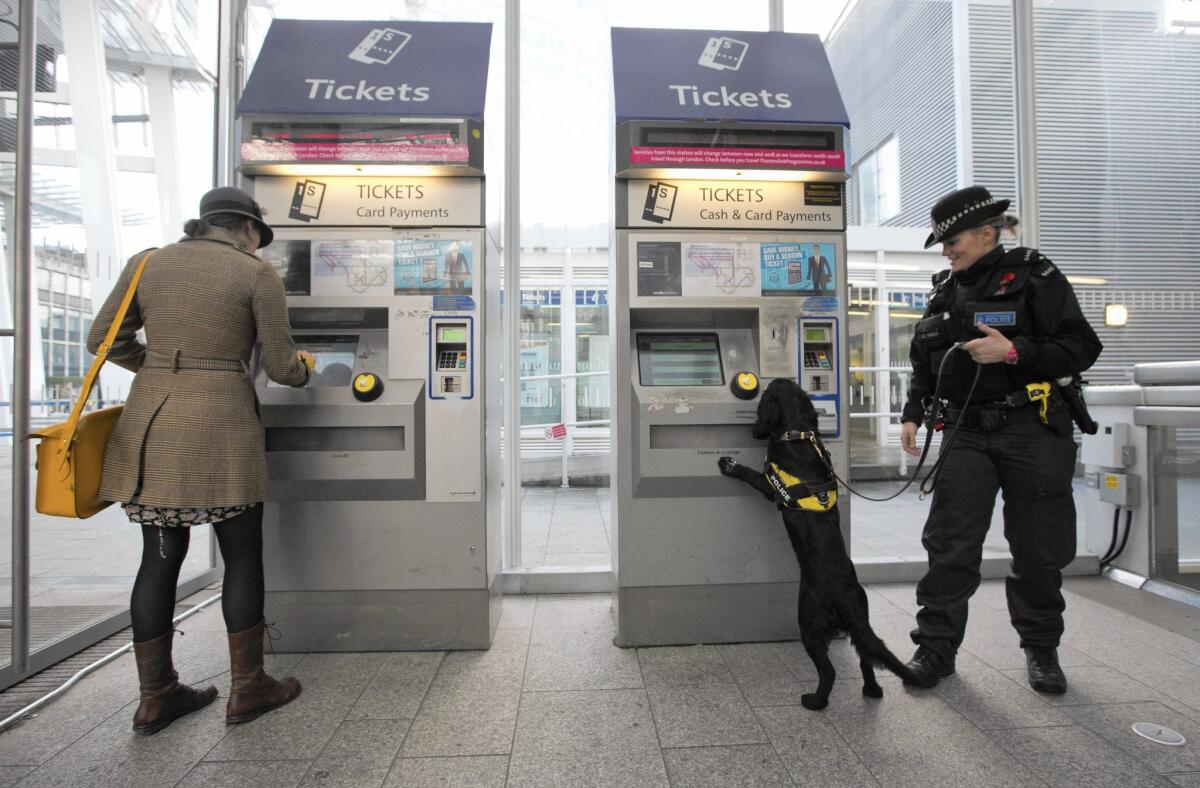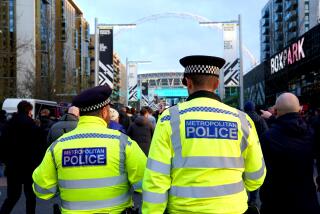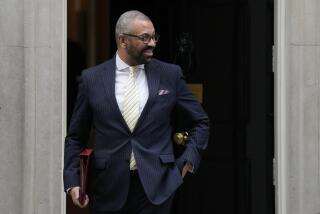British efforts to curb Islamic radicalization seen as ineffective

Bright lights glared overhead at the outdoor playing field where Tarik Khan was deep into a friendly game of seven-a-side soccer in the late-November cold.
Khan, 32, heads a youth league of the Bangladesh Football Assn., a British organization that works within the sizable Bangladeshi community in London’s East End to keep young people active in what are some of the city’s poorest neighborhoods. On Thursday nights, Khan and a group of youth league members in their early 20s meet here at a row of soccer pitches neatly tucked between a train station and the remnants of a disused rail line. Management lets them play for free just before closing.
Khan has known these young men, many of them first- and second-generation British Muslims, since they were children.
“It’s tough growing up here,” said Khan. “There’s a lot of unemployment.”
For more than a decade, the British government has grappled with how to engage with such young people and keep them from falling under the sway of Islamist extremism.
As part of its counter-terrorism strategy, Britain has spent hundreds of millions of dollars on outreach programs. At one point, Khan said, his small youth league was involved in a project that received public funding intended to curb radicalization.
But as Islamic State has made headlines with its actions in Syria and Iraq, and as a number of Britons have appeared in chilling videos released by the Sunni militant group, there’s growing concern that the British government’s strategy for preventing extremism at home has failed.
“Obviously it hasn’t done anything, because the problem is still here, and it’s actually got worse, hasn’t it?” Khan said from the sidelines of the soccer game. “It’s increasingly getting bad by the day.”
This week, Home Secretary Theresa May announced that the terrorism threat against Britain was “perhaps greater than it has ever been.”
Officials estimate that more than 500 Britons have traveled to Syria and Iraq to fight for Islamist extremist groups, and it’s believed that half of them have returned home, prompting fears that they could carry out attacks on British soil.
Earlier this year, the terrorism threat level was raised from “substantial” to “severe,” meaning an attack on the UK is “highly likely.” Last year, two men suspected of being Islamic extremists killed a British soldier on a street in South London, hacking at him with knives.
London’s Metropolitan Police commissioner, Bernard Hogan-Howe, recently told the BBC that, this year alone, police have disrupted as many as five plots to carry out attacks in Britain. Previously, the average had been about one plot a year.
In response, Prime Minister David Cameron’s government is drafting legislation that, if passed, would bar British citizens suspected of fighting in the Middle East from returning to Britain. Their names would be added to a no-fly list and their passports revoked, a controversial move that civil rights groups say would render suspects stateless, in violation of Britain’s international commitments.
Under the new law, if British fighters decided to return home anyway, they would be required to turn themselves over to police at the border, and could face prosecution or severe restrictions on their movement for up to two years.
“A lot of these kids, they don’t care if they get killed or not,” said Khan, questioning the policy proposal. “So making them stateless isn’t really going to mean much.”
“I sympathize with people who do go into this,” he added. “There’s something that’s triggered it. We need to work with them.”
After attacks on London’s transit system in 2005, which took 52 lives as well as those of four suicide bombers, the country stepped up efforts to stop young Britons from turning to terrorism.
Under its so-called Prevent program, the then-Labor government poured money into British Muslim communities. From 2008 to 2009, it spent more than $200 million to fund, among other things, local theater groups and sports clubs, as well as public discussion forums and other activities — all in the hope of influencing Muslim youths.
“The strategy was to blanket whole communities to see what would come in, to see who would engage,” said Fiyaz Mughal, the founder of a London-based outreach organization.
But the program’s close ties to British police led to concerns that it was a ploy to spy on British Muslims.
When Cameron took power in 2010 in a coalition government, the incoming Conservative Party accused Labor of wasting taxpayer funds by confusing counter-terrorism with community building.
Officials have since barred several extremist organizations from receiving public funds, which last year shrunk to roughly $55 million. Mughal, who helped develop the initial Prevent program, says that in cutting back, authorities have opened a window for more radical elements to make inroads.
“The Conservative government, to make sure it didn’t have the same charges leveled against it … slashed back on a whole range of projects,” said Mughal, whose organization currently receives Prevent funding. “In doing so, in some areas, they created a desertification of activities.
“That vacuum,” said Mughal, “was filled by these extreme groups again.”
Raffaello Pantucci, a specialist in counter-terrorism at Britain’s Royal United Services Institute, said one shouldn’t underestimate the “sheer attraction” of the conflict in the Middle East and how easy it is to travel to the region from Britain.
“What’s happening in Syria and Iraq is just such a big, bright beacon out there that’s drawing people in,” he said. “An awful lot … are being drawn out there because they know someone there, because they’re looking for an adventure, or because they’re a petty criminal who’s just sort of wondering, ‘How can I atone for my previous life as a drug dealer in London?’ ”
After taking office, Cameron announced his government would no longer work with groups that, even if nonviolent, may still hold views contradictory to “mainstream British values” such as democracy, freedom of speech and equal rights.
One such example is the East London Mosque, which has hosted a number of controversial speakers in the past, such as Anwar Awlaki, the radical American-born cleric who was later killed by a U.S. drone strike in Yemen.
Yet the mosque boasts a congregation of 7,000 for Friday prayers, and Mughal said organizations like it may be among the few to have any real traction with Prevent’s target audience, although he acknowledges that working with them would be politically difficult.
“We need to reconnect with some of those networks, which actually are picking up people who have very, very extreme views,” Mughal said. “The government’s very risk-averse, and the reality is this work involves some element of risk.”
Werth is a special correspondent.
More to Read
Start your day right
Sign up for Essential California for news, features and recommendations from the L.A. Times and beyond in your inbox six days a week.
You may occasionally receive promotional content from the Los Angeles Times.






